Abraham Maslow was an American psychologist best known for putting together a hierarchy of basic needs that describes the human quest for happiness.
We have put together a simplified version of Maslow’s hierarchy, meant to describe our seven basic survival needs of the body.
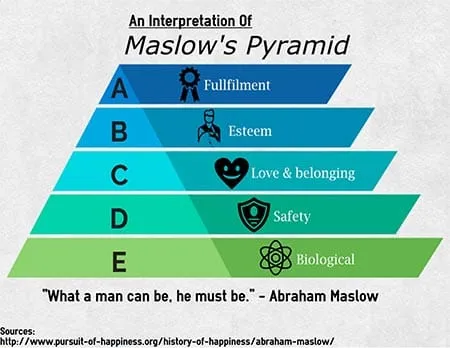
So, which are the parts that make up this human survival needs hierarchy?
- air
- water
- food
- shelter
- safety
- sleep
- clothing (in some cases)
Depending on the situation, the importance of these 7 basic human needs may be lower or higher (except air which you always need, no matter what).
Table Of Contents
You Need Air To Survive
The air you breathe is a mixture of gases that is essential to your survival. You get so used to it that you cannot usually see, taste, or smell it.
Some more notable exceptions to the smell rule are cold air vs hot air (you might not like cold temperatures, but you certainly love the smell of crisp cold air), indoor vs outdoor air, night vs daytime air or city vs country air.
You Can Survive 3 Minutes Without Air
However, the long answer is that it depends on where you are, training and your metabolic rate. You might be able to hold your breath longer underwater due to your “mammalian dive reflex”. In the vacuum of space, it takes about 15 seconds before you faint.
Oxygen Is What Keeps You Alive
Oxygen is the air component that keeps you alive. You use oxygen to produce and transport energy throughout your body. According to NASA, the average person needs 1.85 pounds of O2 per day. They would now, right?
But let’s look at a few, not so known facts about the air you breathe:
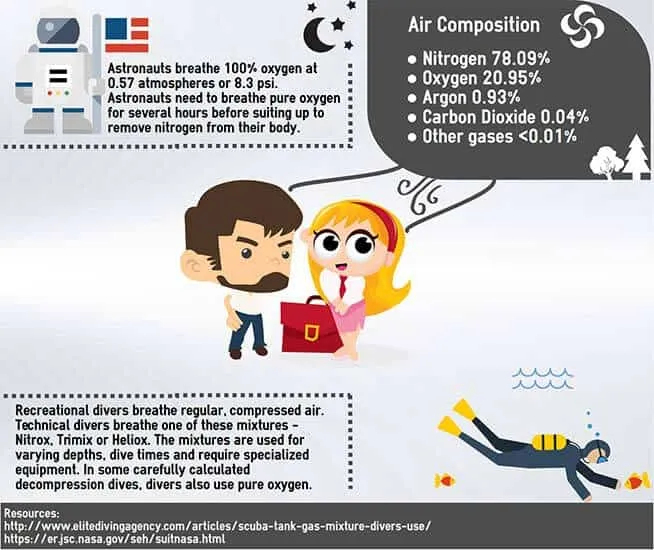
But wait, why has air so much nitrogen? I thought it is oxygen we breathe?
You Need The Right Mixture Of Gases
Geeky stuff:
Nitrogen is an inert gas. It doesn’t interact a lot with your body. You inhale nitrogen, you exhale nitrogen (about 99.26% of what you took in). Like a mantra. Breathe in and breathe out.
In contrast, your body uses 20-25% of the oxygen you inhale. The amount of the oxygen you inhale varies with the atmospheric pressure. For example, if you go on top of Mount Everest, the partial pressure of oxygen can be as dangerously low as 0.07 atmospheres. It gets even more complicated when you dive underwater. If you don’t take special measures, that 0.74% of the nitrogen your body kept can give you the bends, also called decompression sickness.
You do need oxygen for survival. However, the concentration and gas mixture you need varies with the atmospheric pressure and the place where you are.
You Need Clean Air
According to the World Health Organization, 2012 had 3 million premature deaths due to outdoor air pollution. 88% of those deaths were recorded in low to middle-income countries.
Pollutants such as ground-level ozone and particulate matter (soot, smoke, rubber particles, sulfates, nitrates, dust, metals, etc) may affect your health when you breathe them on a regular basis.
You can check your local ambient air quality at https://airnow.gov/.
Water Keeps Your Life’s Flow Going
A mind-boggling 75% of Americans are chronically dehydrated. That means that they fail to meet their body’s water requirements on a regular basis.
You Can Survive 3 Days Without Water
However, the water quantity you need to survive varies based on a few factors such as:
- Age
- Gender
- Health
- Level of activity
- Weather, season & ambient temperature
- Diet
- Medication
- Consumption of alcohol and coffee
The picture below shows some widely-accepted water in the human body facts.
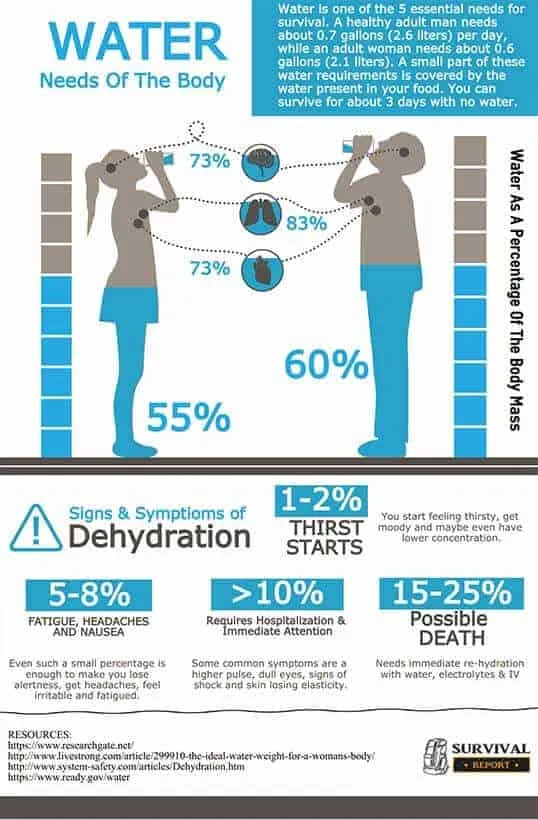
Numbers rounded up to their closest value. Ask a doctor, your actual needs may vary.
Your Body Loses About ¾ Gallon Of Water Daily
Keep in mind that you do take some water from your food. But don’t celebrate yet, because your body loses about 10-12 cups of water daily on its own (sweat, bathroom visits, exercise, etc). You need to replace the fluid every day because chronic dehydration causes issues such as kidney stones, liver, joint and muscle damage.
Got lost on a hiking trip and you are not sure how to find water? Read our how to find and purify water in the wild article.
Some foods and drinks such as protein, alcohol, coffee, and herbal supplements are known to dehydrate you. The fluid loss that they cause varies and might be even be balanced by the water content, such as in the case of coffee.
Other common causes of dehydration are diarrhea, vomiting, diabetes, sweating, burns and certain medication.
Keep in mind that dehydration also affects the level of electrolytes in your body. Electrolytes are minerals that your body needs to function properly. A few of the electrolytes depleted by dehydration are sodium (salt), potassium and calcium. You can replenish those electrolytes from foods and fluids you consume.
You Can Overhydrate, But It’s Going To Take A LOT Of Drinking
Overhydration takes place when you consume too much water, without realizing it. Overhydration is extremely rare under normal conditions. The most common occurrences are during long periods of exercise where excessive quantities of water are consumed or during water drinking contests. The large volume of water consumed disturbs the sodium (salt) balance in the body.
Eating Is A Delicious Way To Stay Alive
You Can Survive Around 3 Weeks Without Food
Your actual nutritional needs and starvation survival period vary based on:
- Age
- Pregnancy
- BMI (Body Mass Index) or body size
- Level Of Activity
- Gender
- Overall health
Your Body Needs Both Macronutrients And Micronutrients For Physical Survival
Macronutrients are the stuff your body needs in large amounts. The main macronutrient groups are fats, proteins, and carbohydrates.
Micronutrients are needed in much lower quantities, but they are as important as macronutrients. They are fat and water-soluble vitamins, essential minerals such as calcium and water.
Macronutrients and micronutrients work hand in hand to keep you healthy and energetic.
A healthy diet (as listed in the picture below) will supply all the macronutrients and micronutrients most people need.
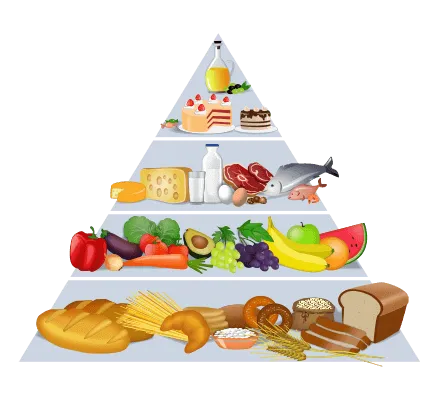
Nutrient Dense Foods Might Help You Survive Longer
Some foods carry a higher nutritional value than others.
A few of the most nutritious foods are beans, sweet potatoes, spinach, a large part of the leafy greens, pumpkins, strawberries, peanuts, pistachios, bison meat, fish, turkey, venison, yogurt and non-processed cheese.
Because these foods have fewer calories but are packed with nutrients and calories, they can also be used for weight loss.
The least nutritious foods are sweets, sugary drinks, processed meats and cheese, fried foods, and refined grains.
However, if food and survival are put in the same sentence that applies to you, you should eat whatever is available:
- Ration your supplies
- Prioritize perishable food
- Look for new sources of food while you have the energy to do so
- Long-term, you should brush up on your gardening knowledge and start your own garden, with native and edible plants.
If You’re Not Eating, Your Body Uses Its Own Reserves For A While
What happens when you don’t eat for a longer period:
- After 6 hours, your body starts using up excess fat and turning it into glucose.
- After 3 days, your metabolism slows down and enters starvation mode. The brain is prioritized and most of the body’s fuel goes to it.
- After a while, the lack of micronutrients (vitamins and minerals) starts to take its toll on the immune system. This means a higher risk of infections and disease.
- Up to 3 weeks, the body starts breaking down muscle tissue to use its high protein content.
- Heart attack or organ failure are the most common cause of death triggered by starvation
“Food will win the war “was one the slogans used during World War 1 United States to compel people to reduce their consumption of food and leave more for the soldiers.
Shelter Before The Storm
A Shelter Protects You From The Elements
Whether you are in your house, car, a tent, an igloo in Greenland, or a shelter made of mammoth bones they all share a common purpose – they protect you from the elements.
A few of the natural hazards that a shelter protects you against are:
- Cold
- Heat waves
- Storms, tornadoes & hurricanes
- Dust storms
- Rain, sleet, snow, hail

A Shelter Offers You Enhanced Safety
Besides protecting you against Mother Nature’s raging moods, a shelter shields you against criminal and animal attacks:
- your house or apartment has windows and doors that you can lock and it might be surrounded by a fence
- more modern dwellings are equipped with motion sensors, alarms, video surveillance that alert the local police department when triggered
- some people prepare their homes against human or animal invasions by using a combination of modern technology, old-fashioned common sense, and defense weapons
- fire is one of the oldest ways to keep animals away from rudimentary shelters but it may attract human attention
If you are in need of shelter, you can call 211 or you can search for a shelter listing online.
A Shelter Offers You Privacy
The harder you make it for criminals to know what happens inside your house, the more likely you are to be safe from them:
- keep your valuables locked and away from sight. Do not show them in a public setting. That will take away some of the motivation for a robber since he doesn’t know if there are any valuables worth taking and where they are.
- Do not let strangers know about work or vacation schedules (sorry, that includes posting on Facebook)
You Shelter With People You Care About
Keeping close to your family has been keeping all the members safer since forever and a day. Taking care of each other through trying times such as sickness, violent attacks or during extreme weather will greatly increase your chances of survival. And it also gives you something to survive for.
Sleep Keeps You Alert And Alive
It is estimated that 30-50% of the population suffers from insomnia with 10% suffering of chronic insomnia. The effects are dangerous enough that they triggered numerous government and private studies researching lack of sleep and the issues it causes.
As An Adult, You Need 7-9 Hours Of Sleep Per Night
The number of sleep hours you need varies with age. For example, in the first 2 years of life, infants need between 11-17 hours of sleep. The number of hours is higher for newborns (14-17) and decreases as the children grow up.
It turns out that scientists are not exactly sure why we need sleep. These are some of the widely-accepted reasons:
- Growth and rejuvenation
- Brain development and memory consolidation
- Energy conservation
Sleep Deprivation Can Deprive You Of Your Health
Modern society pushes you to be more efficient and productive than ever before. If you cut into your shut-eye time regularly this is what will happen:
- You’ll have trouble focusing.
- You’ll become more forgetful.
- You will be at a higher risk for disease.
- You’ll start gaining weight
- You’ll lose your sex drive
- Your skin will age faster
- Your judgment will be impaired
Staying Awake For Long Periods Of Time Might Literally Kill You

Lack of sleep becomes dangerous because of 2 reasons:
- It Impairs Your Judgement And Makes You Delirious
The best examples are out of the aviation industry where sleeplessness and fatigue became so dangerous that they caused slow, impaired reactions, hallucinations and even caused crashes.
- It Affects Your Metabolism & Immune System
An experiment on rats shows that sleep deprivation caused their imminent deaths within 11-32 days. The voluntary sleep deprivation record holder among humans stayed awake for 11 days. Randy Garner’s experiment was considered so dangerous that the Guinness Book removed the sleep deprivation record out of fear of others trying to beat it.
Safety Is A State Of Mind
Safety is a state of being protected against physical or psychological harm and against other hazardous outcomes. Safety is one of the basic human needs that can be affected by the other ones: for example, someone has their safety threatened if someone is depriving them of food.
There is a blurry line between safety hazards and certain health hazards. The main 2 differences between them are:
- The amount of time it takes to see the negative effects
- Some of the health hazards are not very well known or documented. Mainly because it takes sometimes years for the cumulative negative effects to start showing and that makes them hard to study.
For this part of the article, we’re only going to look at the more immediate safety needs.
Know How Your Physical Location Affects Your Safety
Where you are at a certain time influences how safe you are:
At home
The biggest risk at home is not crime or home invasion, but yourself. Prescription pill poisoning and suicides are the leading cause of death at home.
On The Road
Vehicle crashes cause fewer deaths than poisoning or suicides. However, it is still a major concern. Cell phone usage and driving under influence are two of the leading causes of fatal crashes.
In “Bad” Neighborhoods
Crime is more concentrated in certain areas than others. The major factor that crime-ridden areas have in common is poverty.
At Work
Most deaths at work occur while driving or because of falls. The next causes are contacts with objects or equipment and violence by persons and animals.
Dress To Impress
You may argue that you can survive indefinitely without clothes. Hey, it might even be fun, right?
Well, yes and no. Your short-term survival is affected by clothing only during extreme weather, if you have a hazardous job and when you need to keep yourself safe in bad neighborhoods. Longevity and long-term survival are affected a lot more. Without clothes, you’d be at higher risk for infections, skin cancers, deal with a lot more hygiene issues and generally wear out your body faster.
Clothes have always played a vital role in human society:
- To cover our private parts, remove temptation and reduce competition between romantic rivals
- To present ourselves in a more flattering light to romantic interests or to the larger society, in general
- They helped you fit in and look more like society expected you to
- For obvious sanitary conditions
- To develop a stronger, unique individual image
- To identify your occupation or your place in the chain of command
- To hide your beer belly
- To protect yourself from the elements and a few other hazards
You Need Clothes To Protect You From The Elements
They keep you warm, cool, dry and insulated from extreme weather.
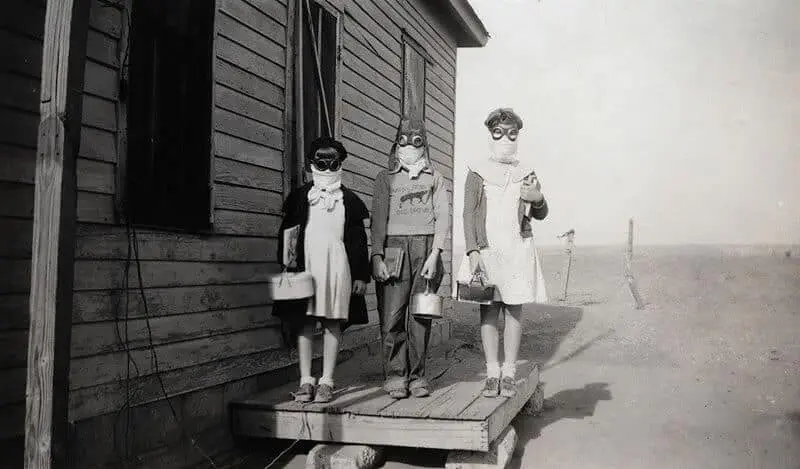
Clothes Protect You From Certain Hazards
Some good examples are work gloves, steel toe boots, specialty cold weather gear such as ice fishing boots, or full body suits such as diving or astronaut suits.
You Have To Wear Clothes Because Society Expects You To
Not wearing clothes may not threaten your immediate survival in the United States, although it could get you arrested. However, that changes in more strict societies across the world where it can get you beaten, tortured or even executed.
Your Attitude Increases Your Survival Chances
When you are dealing with survival situations, two of the most important factors are preparedness and attitude.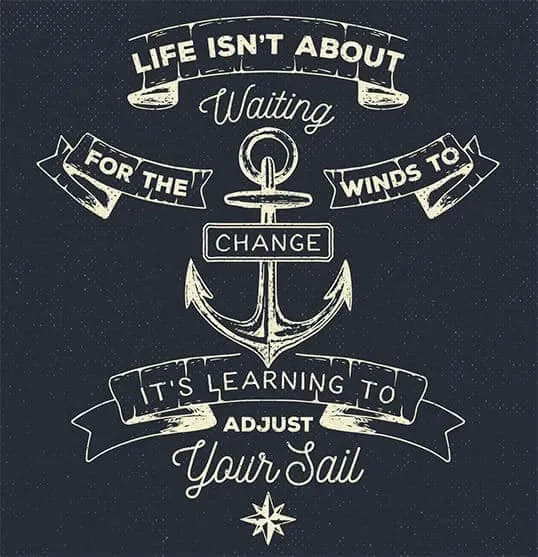
Here are a few facts that show how important attitude is for survival:
- Defensive driving has been proven repeatedly to noticeably reduce your risk of getting in an accident
- Mental illness causes 90% of the suicides. A positive attitude helps interpret bad situations differently than a negative attitude. Pessimism is known to make mental health issues worse
- It is believed that a positive attitude is one of the factors that may help you combat disease
- Starvation, extreme weather, and catastrophe survivors tell stories of how their attitude helped them to stay alive
- Your attitude also protects you from psychological harm, both self-inflicted or by other people’s hand
- It has been proven that a cooperative attitude and being part of a larger survival group increases your chances of keeping safe
Other Resources:
https://chemistry.stackexchange.com/questions/61406/why-would-breathing-pure-oxygen-be-a-bad-idea
https://en.wikipedia.org/wiki/Atmosphere_of_Earth
https://en.wikipedia.org/wiki/Dehydration#Cause
https://www.cdc.gov/pcd/issues/2014/13_0390.htm
https://crashstats.nhtsa.dot.gov/Api/Public/ViewPublication/812246




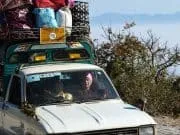







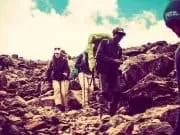
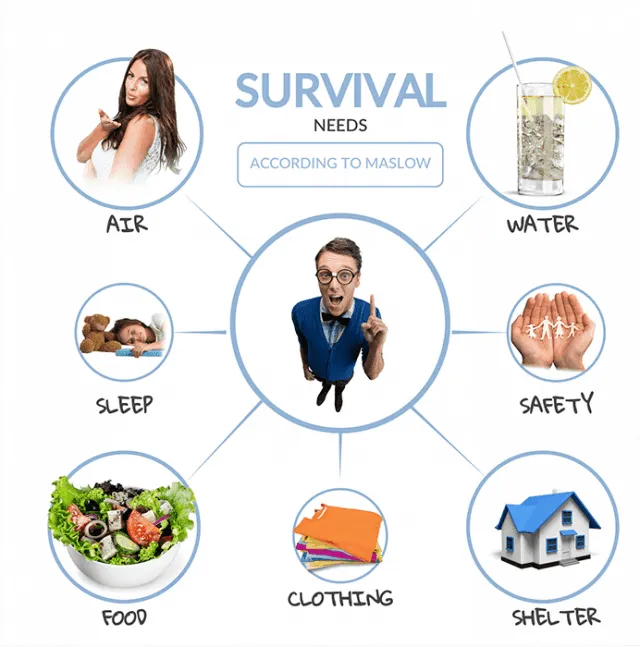



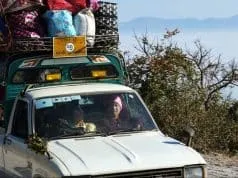

Not mentioned is the basic need of sanitary elimination that minimizes the spread of human waste diseases.